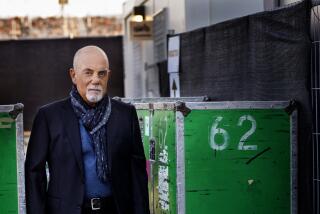POP MUSIC REVIEW : J.J. Cale Hunkers Down in Savory, Living-Room Comfort
- Share via
SAN JUAN CAPISTRANO — However much J.J. Cale might protest that his image as a recluse was manufactured by the press, his performances of old did little to dispel that image.
In shows only a couple of years ago, the Oklahoman author of “After Midnight” and “Cocaine” might have been playing to a wall instead of an audience for all the acknowledgement he gave the crowd. Between the time he stepped on stage until he left, there often would not be so much as a “hello” or a flicker of eye contact with his fans.
But even at his most aloof in terms of showmanship, Cale always had the welcome mat out where it mattered: The smoky, slow-cooked savor of his music invariably drew listeners in.
At the Coach House on Monday, the 51-year-old singer-guitarist seemed a new man, talking and joking between songs and generally seeming comfortable with the idea that he was in a room full of people.
A fresh, open-eyed approach also seemed to infuse his music. His old shows could give listeners the feeling they were peeking through a window at a bunch of friends having a relaxed and insular living-room jam. While Cale and his miraculous six-piece band retained that special feel Monday, they also have turned it outward, playing with such a spark that they seemed intent on carpeting the whole world with their living-room vibe.
Cale has always managed to find players responsive to his musical whims, but he has outdone himself with some real groove monsters this time. Joining longtime cohorts Jim Cruce on drums, Jimmy Karstein (who makes even a tambourine a fluent instrument) on percussion and Christine Lakeland on guitar and vocals were pedigreed players Steve Douglas, Tim Drummond and Spooner Oldham.
Saxman Douglas has been a rock studio legend since starting with Duane Eddy in the ‘50s, while bassist Drummond has worked with everyone from James Brown to Bob Dylan. Keyboardist Oldham co-penned such soul and country classics as “Do Right Woman” and laid down keys behind Aretha Franklin, Wilson Pickett and countless others (that’s Oldham’s organ on Percy Sledge’s immortal “When a Man Loves a Woman”).
Seven-player rock bands can be cumbersome affairs, but Cale’s group played like a simmering stew, where personality-filled solos bubbled to the surface while still adding their flavor to the overall mix. Cale’s spare but highly rhythmic finger-picked guitar provided the recipe for the songs, though they remained continually open to revision and spicing.
Cale’s current “Travel-Log” album rates as his most enlivened work, and the summer-fireworks spirit of its songs translated well to the stage. “No Time” and “Hold On Baby” both had an insistent locomotive drive, while the pulsing, sensual “Humdinger” was nudged on with stings from Cale’s slide guitar. The only album tune not up to the recorded version was “New Orleans.” Though it had plenty of atmosphere from Douglas’ snaking soprano sax lines and Oldham’s Randy Newman-like piano dissonances, it lacked the magic of Al Capps’ orchestrated street-funeral arrangement.
Eschewing both current high-tech and funky old equipment (he used to be noted for playing a beat-to-hell Sears guitar), Cale bravely did his picking on a budget Casio guitar, with a built-in synthesizer used lightly to broaden his tonal palette in places. Though one suspects that he would have little trouble executing the highly dramatic flash solos of his admirer Eric Clapton, Cale instead worked to achieve a deceptively low-keyed, precarious balance between invention and adherence to the songs’ simple forms.
On “The Best I Ever Had,” that meant weaving a delicate web of notes to support the gentle lyric, while on Don Nix’s blues standard “I’m Goin’ Down” he perversely overlaid some flamenco-flavored licks.
Douglas also peppered nearly every song with solos on soprano, alto or tenor saxes; his workout on the Viscounts’ moody version of Johnny Otis’ “Harlem Nocturne” was a standout.
One would think that after playing “After Midnight” countless times and seeing it turned into a turgid suds anthem by Clapton, Cale would be pretty well fed up with the song. Instead, he made it the highlight of the show, pumping out an exuberant, racing version, where his chugging guitar alone could have powered it into next week.
More to Read
The biggest entertainment stories
Get our big stories about Hollywood, film, television, music, arts, culture and more right in your inbox as soon as they publish.
You may occasionally receive promotional content from the Los Angeles Times.









